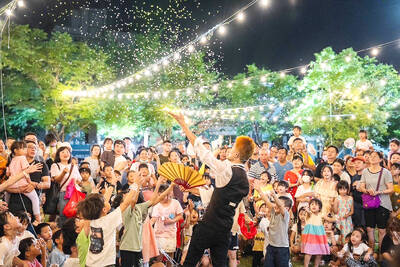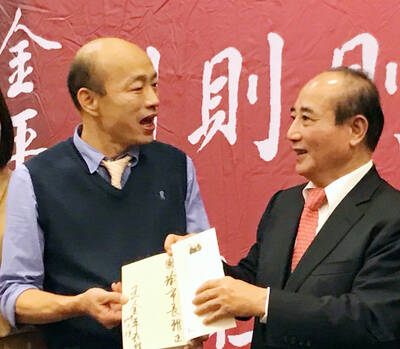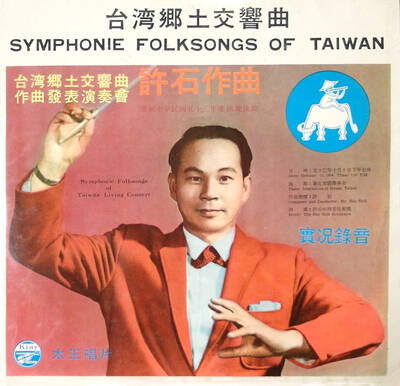Pop singer, songwriter and producer Yen-j (嚴爵) will perform a concert titled Yen-j: Y3 Original Composition Concert (嚴爵Y3全創作演唱會) at Legacy Taipei tomorrow in support of his newly released third album, Simple Love (單細胞).
“I’m not an idol. I’m an ordinary person,” Yen-j told the Taipei Times last week. “I fall in love and live a life just like everyone else. I want to share this with the audience through music.”
The talented singer and songwriter shot to instant stardom with his pop/jazz debut Thanks Your Greatness (謝謝你的美好) in 2010. His 2011 follow-up album, Not Alone (不孤獨), veered towards pop, while Simple Love ventures into electronica.

Photo Courtesy of B’in Music
With the title track Simple Love, he returns to ground zero by singing a love song with a simple melody and unadorned vocals. In Temporary Boyfriend (暫時的男朋友), another track, Yen-j passionately avows that he is willing to be the “rebound” boyfriend for his beloved.
“Electronica is the ‘in’ thing these days,” he said. “But I try to do it differently, by blending folk melodies with pulsating beats.”
Yen-j is versed in at least five instruments, including jazz piano, guitar, bass, drum and trombone.
“I explore the instruments by myself and slowly get the hang of it,” he said.
Similar to pop singer Nylon Chen (陳乃榮), Yen-j calls himself a zhainan (宅男, a euphemism for a nerdy person who spends all his waking hours playing video games), because he spends “95 percent” of his life on music.
Yen-j began his career performing in San Francisco jazz bars while still in high school, spent one short semester at university, and then dived headlong into a pop star career in Taiwan. “I haven’t even been to a bar and got drunk yet,” he laughed.
“I write music every day as if it’s my diary,” he said. “Sometimes, it’s a one minute-ditty. Sometimes, it becomes a single.”

The depressing numbers continue to pile up, like casualty lists after a lost battle. This week, after the government announced the 19th straight month of population decline, the Ministry of the Interior said that Taiwan is expected to lose 6.67 million workers in two waves of retirement over the next 15 years. According to the Ministry of Labor (MOL), Taiwan has a workforce of 11.6 million (as of July). The over-15 population was 20.244 million last year. EARLY RETIREMENT Early retirement is going to make these waves a tsunami. According to the Directorate General of Budget Accounting and Statistics (DGBAS), the

Many will be surprised to discover that the electoral voting numbers in recent elections do not entirely line up with what the actual voting results show. Swing voters decide elections, but in recent elections, the results offer a different and surprisingly consistent message. And there is one overarching theme: a very democratic preference for balance. SOME CAVEATS Putting a number on the number of swing voters is surprisingly slippery. Because swing voters favor different parties depending on the type of election, it is hard to separate die-hard voters leaning towards one party or the other. Complicating matters is that some voters are

Sept 22 to Sept 28 Hsu Hsih (許石) never forgot the international student gathering he attended in Japan, where participants were asked to sing a folk song from their homeland. When it came to the Taiwanese students, they looked at each other, unable to recall a single tune. Taiwan doesn’t have folk songs, they said. Their classmates were incredulous: “How can that be? How can a place have no folk songs?” The experience deeply embarrassed Hsu, who was studying music. After returning to Taiwan in 1946, he set out to collect the island’s forgotten tunes, from Hoklo (Taiwanese) epics to operatic

Five years ago, on the verge of the first COVID lockdown, I wrote an article asking what seemed to be an extremely niche question: why do some people invert their controls when playing 3D games? A majority of players push down on the controller to make their onscreen character look down, and up to make them look up. But there is a sizable minority who do the opposite, controlling their avatars like a pilot controls a plane, pulling back to go up. For most modern games, this requires going into the settings and reconfiguring the default controls. Why do they